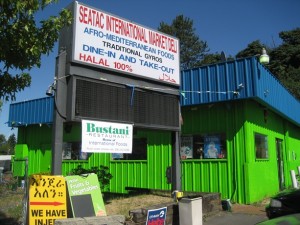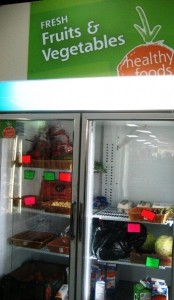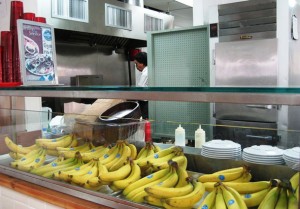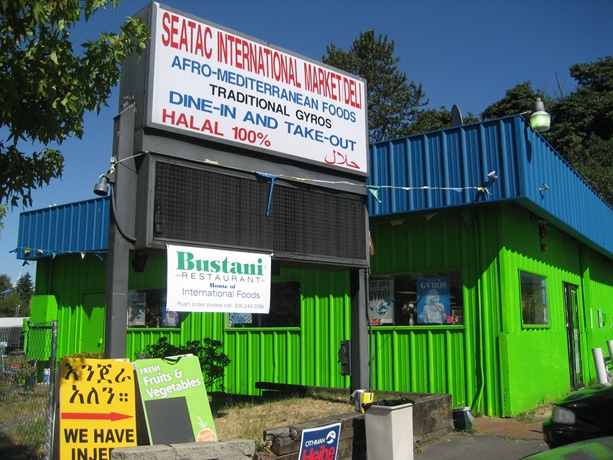With an eye to the future, a federally-funded program is underway that is designed to help Americans eat healthier foods and fend off ailments stemming from obesity, including heart disease and diabetes.

The Healthy Foods Here (HFH) program operates synergistically. First, it identifies neighborhoods that are food deserts – households that have inadequate access to a grocery store – and works to expand the offerings of local corner stores so that they become fresh-food purveyors. In doing so, it also incorporates local farms into the equation, bringing them in as suppliers to the corner stores. Finally, recognizing that food deserts tend to be in low-income areas that are home to new immigrants, the program calls for the identification of popular foods in those ethnically-diverse communities, and finds ways to have them grown by the local farmers and then stocked by the corner stores.
Funding from the American Recovery and Reinvestment Act (ARRA) has paved the way for the initiative that links local farmers to corner store owners. It is currently in progress in the southern portion of Washington State’s King County, as well as in a handful of other locations across the country. The purpose, said Erin MacDougall, a program manager from Public Health – Seattle & King County, is to address the negative health issues that stem from the consumption of too many snack foods.
The federal stimulus funding was originally awarded to the Centers for Disease Control, and the CDC then distributed it to various other agencies. In King County, a partnership between the Public Health department and the Seattle Office of Economic Development (OED) administers the $15 million award, distributing it via smaller grants to community-based organizations.
One such funding recipient is Washington-based Burst for Prosperity (you can learn more about this organization in our June story on a local group of Somali Bantu farmers and the Burst-Seattle Tilth farm incubator).

Burst and Seattle Tilth have teamed up again for this new initiative, capitalizing on their access to locally-grown produce, both from the incubator – the United People’s Farm – and other suppliers, and their familiarity with working in immigrant communities.
The latter is especially important in this context, as most of the corner store owners who are participating in the program are immigrants from East and West Africa, Mexico, Korea, and India. In order to attract and keep participants, “you must build relationships and trust,” said Njambi Gishuru, Burst’s Community Organizer, and “overcome the language and cultural barriers.”
Profitability must also be addressed. Some store owners don’t feel that they can afford to buy first-quality produce, according to Gishuru, and resort to buying less-fresh seconds from other distributors. They also worry about the short shelf-life, and the need to move it out the door before it goes bad, she said.
Seattle Tilth is playing a primary role in the set-up of the distribution channels for their portion of the program. Finding a price-point that works for both farmers and store owners means “having to be creative,” said Eddie Hill, Tilth’s farm incubator program manager. He said he considers it part of building a model “for how to reintegrate urban and suburban agriculture into our society.”
The program’s challenges extend beyond attracting participants; they must also convince the larger community to become involved. Lessons were learned from a Kellogg Foundation-funded pilot in Seattle’s Delridge and White Center neighborhoods. Carried out as the King County Food and Fitness Initiative (KCFFI), it presently has six corner stores that are selling healthy foods. “There needs to be outreach to the community to create the demand,” MacDougall said. “It wasn’t sufficient just to have the stores change what they stocked on their shelves.”

To that end, Burst’s current efforts include community education and launch events. These could be at the new HFH stores, or even right in the community, such as an event that Gishuru is planning for a Skyway, WA, apartment complex that is home to about 1,800 Somali residents. Stores also receive help with merchandising and interior signage in order to create displays that will attract customers to the locally-sourced produce.
In addition to getting assistance with creating customer demand for the new produce, store owners also receive technical assistance with bookkeeping, building distributor relationships, managing coupon promotions, and pricing. Another element – and critical for the program’s success – are the incentives. They include access to loans for installing energy-efficient refrigeration equipment, as well as seed capital of up to $7,500 per store (with the store having to match 20%) for other retail equipment, outside signage, and façade improvements.
Back at the United People’s Farm at Red Barn Ranch in Auburn, WA, Hill said he has just finished distributing seeds to the farmers for their winter crops. The strategy is for the Somali Bantu farmers – and others who will join as part of the next group – to adopt a four-season growing cycle so that the farms can be linked in to the corner stores year round. Per the current schedule, Burst and Seattle Tilth will have teamed with 17 locations by the time the grant expires at the end of March, 2012.
Federal funding for the program past that date is uncertain. Hill said that Seattle Tilth will continue its work at the neighborhood and community levels, regardless of where the money comes from. “We have to sustain those relationships, under whatever program banner.”
There is both contemplation and urgency in Hill’s message. He sees necessity in bringing rural and urban, third generation and recent refugees together to find common ground and aggregate forces. With the current momentum in the local food movement, Hill said that the window of opportunity is open right now. “We don’t have another 100 years to wait for this to happen.”


People have the right to eat whatever they want. In a free market, businesses have the right to sell whatever they want. Your use of government money in an attempt to force people to do your bidding and to impose your will upon business owners is not conducive to the way a free-market republic works. I realize you all think you’re terribly smart, but this is nothing new; read your history books, children.
I agree — people have the right to eat (and sell) whatever they want, and what this program aims to do is reduce barriers to access so that the people that want to be able to buy/sell fresh food are able to do so, e.g. identifying a distribution system so that the small business owners can buy in small quantities, etc. Thank you for your comment.
Liza and Eddie, thank you for all of your hard work on the ground!
Scott, thank you for taking the time to give feedback. Much appreciated.
Thank you for a wonderful article, Laura! If anyone wants to know more about the Farm Incubator Program, visit:http://seattletilth.org/about/farmincubatorprogram.
Thanks for a great article providing some of the work being done on the ground by public partners! It is good for people to know how the dollars work, so they can better understand where they need to go. Much appreciated.
Excellent article. Well written, informative and, most of all, inspiring. It’s nice to see organizations working towards healthy alternatives to processed food while at the same time offering more diverse options for meal time.